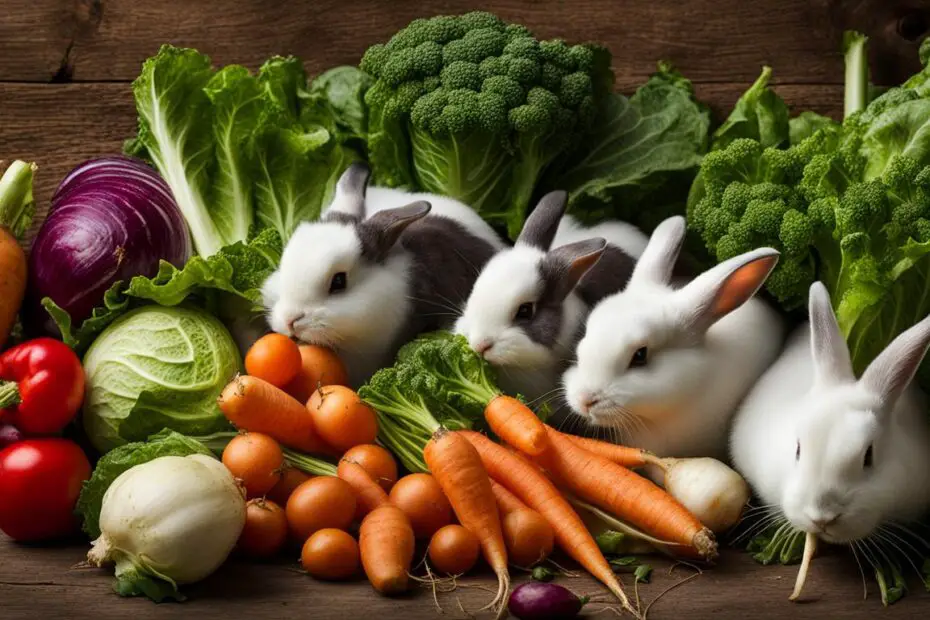When it comes to feeding your beloved pet rabbit, ensuring they have a well-balanced diet is key to their health and happiness. While hay should make up the majority of their daily food intake, incorporating fresh vegetables into their diet is essential for providing essential nutrients and variety. But, what veggies can rabbits eat daily?
Feeding your rabbit vegetables can be a nutritious and delicious addition to their daily meals. However, it’s important to remember that vegetables should only account for about 10% of their overall diet. The bulk of their diet should consist of high-quality hay, such as timothy or orchard grass, which provides essential fiber for their digestive health. Pellets should also be given in moderation, serving as a supplement rather than a main source of nutrition.
Introducing vegetables slowly and in small quantities is essential to prevent any digestive issues. Some safe vegetables for rabbits include leafy greens like romaine lettuce, Bok choy, and cilantro. Other options include bell peppers, Brussels sprouts, carrot tops, cucumber, and zucchini. These vegetables provide important vitamins and minerals that contribute to your rabbit’s overall well-being.
Always remember to wash the vegetables thoroughly and serve them fresh to your furry friend. Remove any uneaten vegetables within a few hours to maintain cleanliness. It’s also crucial to monitor your rabbit for any signs of digestive discomfort or allergies when introducing new vegetables.
Key Takeaways:
- Hay should make up the majority of a rabbit’s diet, providing essential fiber.
- Vegetables should only account for 10% of a rabbit’s diet.
- Introduce new vegetables slowly and monitor for any digestive issues.
- Safe vegetables for rabbits include leafy greens, bell peppers, and cucumbers.
- Wash vegetables thoroughly and serve them fresh to your rabbit.
The Importance of Hay in a Rabbit’s Diet
Hay is a crucial component of a rabbit’s diet as it provides them with essential fiber and helps maintain their digestive health. It should make up the majority of their daily food intake, accounting for about 80-90% of their diet.
When it comes to choosing the right hay for your rabbit, there are several options available. Timothy hay, orchard grass, brome, and oat hay are some of the recommended types of grass hay for rabbits. These hay varieties are rich in fiber and low in protein and calcium, making them suitable for adult rabbits.
Image:
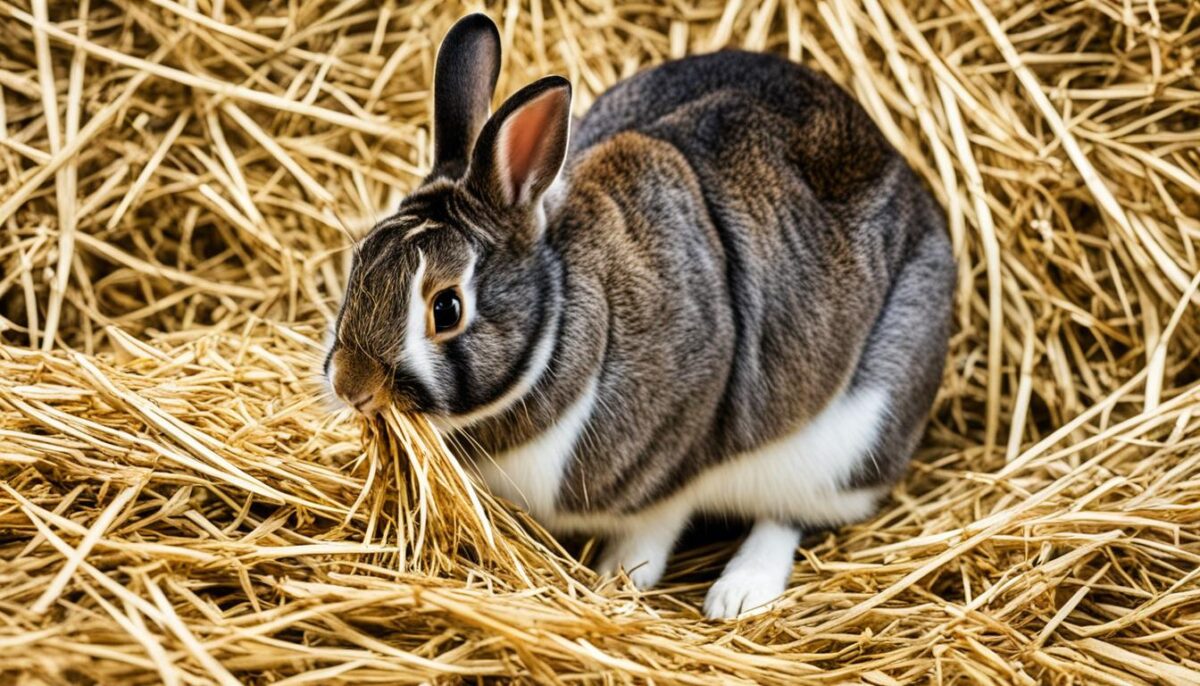
While alfalfa hay is high in protein and calcium, it is more suitable for young rabbits and should be limited in the diet of adult rabbits. It is important to consider adult rabbits’ dietary needs, as excess calcium can lead to urinary tract issues. Offering variety in hay types can also keep your rabbit interested and engaged in their diet.
Rabbits should have constant access to fresh hay, which they can graze on throughout the day. This helps with their dental health, as the chewing action on hay wears down their continuously growing teeth. In addition, the high fiber content of hay promotes proper digestion and prevents gastrointestinal issues.
The Benefits of Hay in a Rabbit’s Diet:
- Provides essential fiber
- Maintains digestive health
- Aids in dental wear
- Prevents gastrointestinal issues
Remember to store hay in a cool, dry place to maintain its freshness and nutritional value. Inspect the hay for any signs of mold or dust, as these can be harmful to rabbits. It is recommended to change the hay daily to ensure cleanliness.
“Hay should make up the majority of a rabbit’s diet, providing essential fiber and promoting proper digestion.”
Next, we’ll explore the role of vegetables in a rabbit’s diet and the various options that are safe to include.
Vegetables: A Healthy Addition to a Rabbit’s Diet
Vegetables play an essential role in a rabbit’s diet, providing important nutrients and variety. They should make up about 10% of a rabbit’s daily food intake. Leafy greens are particularly beneficial for rabbits, offering a range of vitamins and minerals. Some safe vegetables for rabbits include:
“Leafy greens, such as romaine lettuce, Bok choy, and cilantro, are great options for rabbits. Other safe vegetables include bell peppers, Brussels sprouts, carrot tops, cucumber, and zucchini.”
Introducing new vegetables gradually is crucial to monitor any possible digestive issues. Washing vegetables thoroughly and serving them fresh to rabbits ensures their safety. Below is a table listing some safe vegetables that rabbits can enjoy:
| Vegetable | Nutritional Benefits |
|---|---|
| Romaine Lettuce | Rich in vitamin A and K |
| Bok Choy | High in calcium and vitamin C |
| Cilantro | Contains antioxidants and vitamin C |
| Bell Peppers | Excellent source of vitamin C and fiber |
| Brussels Sprouts | High in fiber and vitamin C |
| Carrot Tops | Provide vitamin K, calcium, and fiber |
| Cucumber | Hydrating and low in calories |
| Zucchini | Rich in vitamins A and C |
Remember, it’s important to offer a variety of vegetables to ensure a well-rounded diet for your rabbit. Just like with any new food, observe your rabbit’s response and adjust accordingly. By incorporating safe vegetables, you can provide your furry friend with a healthy and enjoyable eating experience.
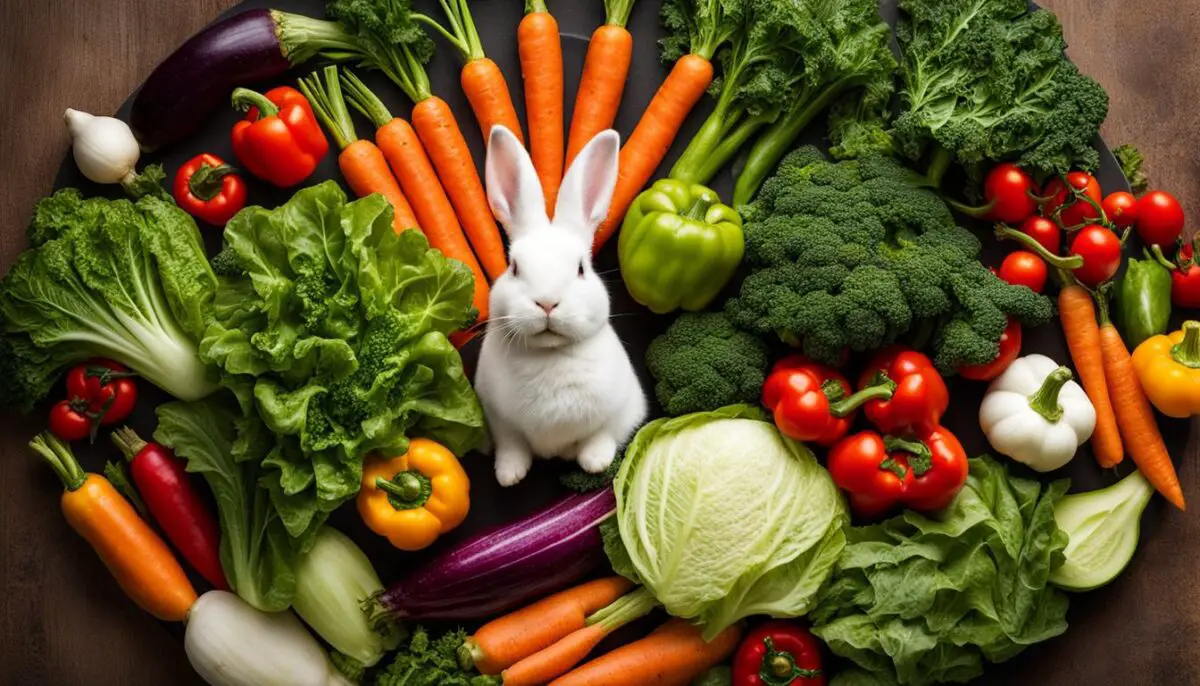
Fruit: A Sweet Treat for Your Rabbit
While hay and vegetables form the bulk of a rabbit’s diet, fruits can be given as an occasional treat. However, it’s important to remember that fruits should only be offered to rabbits in limited quantities. Excessive consumption of fruits can upset their delicate gastrointestinal tract, as fruits are high in natural sugars. To ensure the health and well-being of your furry friend, it’s crucial to introduce new fruits slowly and keep a close eye on any potential digestive issues.
If you’re wondering which fruits are safe and appropriate for rabbits, you’ll be pleased to know that there are several options to choose from. Some of the most common fruits that rabbits can enjoy include:
- Apples: Rich in fiber and packed with vitamins, apples are a great choice for rabbits. However, make sure to remove the seeds and core as they can be harmful.
- Bananas: Bananas are a delicious and nutritious treat for rabbits. These tasty fruits are a good source of potassium, vitamin C, and vitamin B6.
- Berries: Raspberries, strawberries, and blueberries are safe and healthy fruits for rabbits. They are low in sugar and high in antioxidants, making them an excellent choice for a sweet treat.
- Cherries: Cherries can be a delightful occasional treat for rabbits. However, it’s important to remove the pits, as they contain cyanide, which is toxic to rabbits.
- Melon: Watermelon and cantaloupe are refreshing fruits that rabbits can enjoy. They are hydrating and provide a good source of vitamins and minerals.
When offering fruits to your rabbit, it’s essential to remember portion control. The recommended serving size is approximately 1 to 2 tablespoons of fruit per 5 pounds of body weight. This ensures that your rabbit receives the nutritional benefits without overloading their system with excessive sugar.
So go ahead and treat your furry friend to a fruity delight! Just remember to offer fruits as an occasional indulgence, prioritize a balanced diet consisting mainly of hay and vegetables, and always monitor your rabbit for any signs of digestive discomfort.
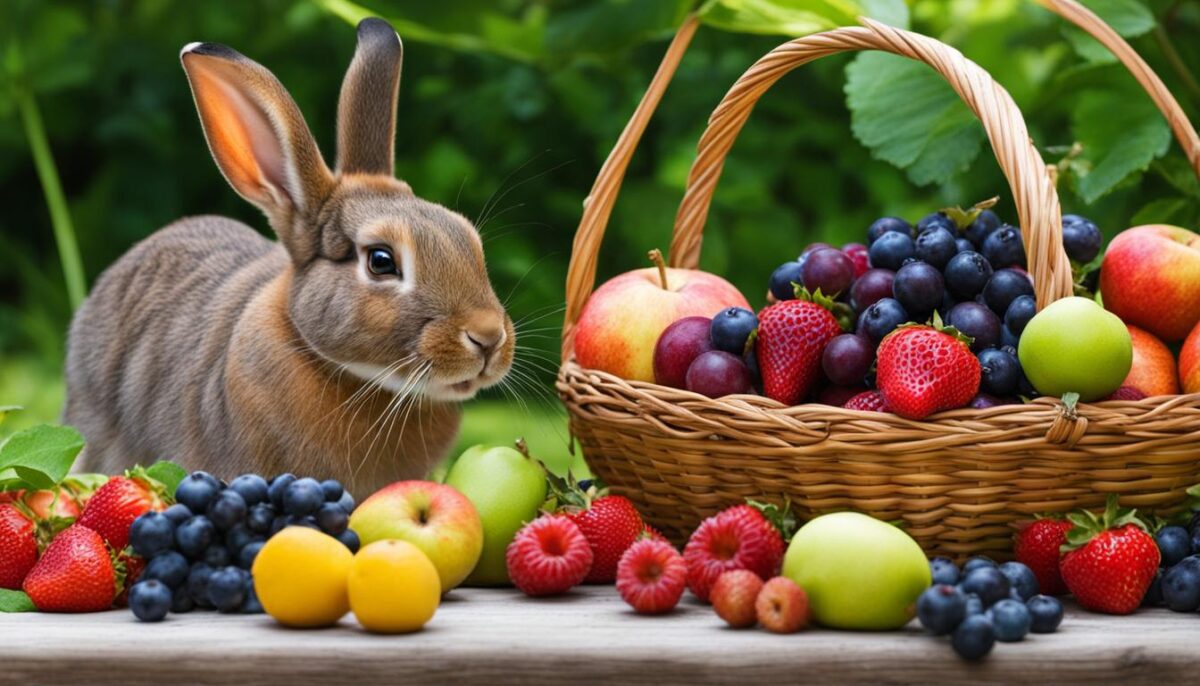
Pellets: A Supplement to a Rabbit’s Diet
Pellets play a crucial role in supplementing a rabbit’s diet. While hay and fresh vegetables should make up the majority of their meals, pellets provide essential nutrients and should only constitute a small portion of their daily intake.
For adult rabbits, it is recommended to offer approximately 1/4 cup of pellets per 5 pounds of body weight. However, it is important to choose the right type of pellets to ensure a healthy diet for your furry friend.
Timothy Hay-Based Pellets for Adult Rabbits
When it comes to selecting pellets for adult rabbits, opt for those that are timothy hay-based. Timothy hay is lower in protein and calcium compared to other types of hay, making it a suitable choice for adult rabbits who require a balanced diet.
Alfalfa-Based Pellets for Young Rabbits
If you have a young rabbit, consider providing alfalfa-based pellets. Alfalfa hay is higher in protein and calcium, which are essential for the growth and development of young rabbits. However, it is important to transition to timothy hay-based pellets as your rabbit matures to prevent any imbalances in their diet.
Choosing the Right Pellets
When selecting rabbit pellets, always look for options that have a high fiber content. Fiber is essential for a rabbit’s digestive health, as it helps prevent common issues like hairballs and gastrointestinal stasis. Avoid pellets that contain added sugars, corn, nuts, and seeds, as these ingredients can lead to obesity and digestive problems.
Table: Types of Rabbit Pellets
| Type of Pellet | Recommended for | Key Features |
|---|---|---|
| Timothy Hay-Based Pellets | Adult rabbits | Low in protein and calcium, high in fiber |
| Alfalfa-Based Pellets | Youth rabbits | Higher in protein and calcium, suitable for growth |
Note: Ensure the pellets have a high fiber content and avoid those with added sugars, corn, nuts, and seeds.
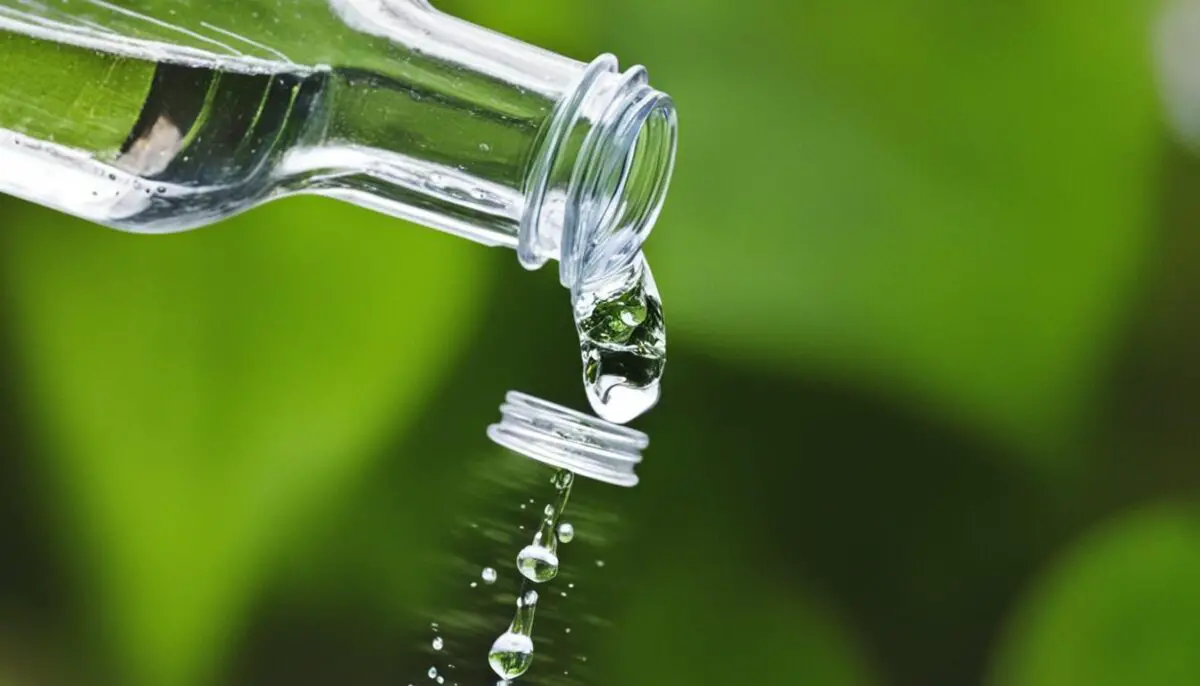
Benefits of Providing Adequate Water to Rabbits:
- Promotes proper digestion and prevents digestive issues
- Aids in maintaining healthy body temperature
- Sustains proper organ function
- Prevents urinary tract problems
- Keeps the rabbit’s skin and coat healthy
| Signs of Dehydration in Rabbits | What to Do |
|---|---|
| Dry or tacky mouth | Offer fresh water immediately and monitor water intake |
| Loss of skin elasticity | Consult a veterinarian for proper hydration treatment |
| Lethargy or decreased activity | Ensure rabbit has easy access to water and monitor behavior |
| Decreased or no urine output | Consult a veterinarian for further evaluation and treatment |
Proper hydration is vital to a rabbit’s overall health and well-being. By providing fresh water at all times, you are ensuring that your rabbit stays hydrated and avoids the risks associated with dehydration. Don’t neglect the importance of water in your rabbit’s diet.
Rabbit Treats: Proceed with Caution
Treats can be a fun way to reward and bond with your rabbit, but it’s essential to offer them in moderation. Overindulging in treats can lead to weight gain and digestive issues, so it’s important to choose healthy options that won’t compromise your rabbit’s well-being.
When it comes to rabbit treats, opt for small pieces of fresh or freeze-dried fruit, such as apple or banana slices. These natural treats provide a burst of sweetness and can be a delightful surprise for your furry friend. Remember to remove any seeds or pits before feeding fruits to your rabbit to ensure their safety.
| Treat Options | Description |
|---|---|
| Hay and dried flower mixes | These mixes offer a variety of textures and flavors while providing the additional benefits of fiber and mental stimulation. |
| Specific rabbit treats | There are numerous rabbit treats available on the market formulated specifically for their dietary needs. These treats often come in pellet or biscuit form, making them convenient for training or occasional indulgence. Remember to check the ingredient list and avoid treats with added sugars, preservatives, and artificial coloring. |
It’s important to note that not all treats suitable for humans are safe for rabbits. Foods that are difficult for rabbits to digest, such as chocolate and nuts, should be strictly avoided. These foods can cause severe health issues and even be fatal to rabbits.
“Treats should be given sparingly to rabbits to avoid weight gain and digestive issues.”
When offering treats, always consider your rabbit’s overall diet and health. Aim to strike a balance between treating and maintaining a high-quality, nutritious diet consisting of hay, vegetables, and pellets. Remember, the mainstay of your rabbit’s diet should always be fresh hay, as it provides essential fiber for proper digestion and dental health.
Conclusion
In conclusion, a balanced daily diet is essential for the overall well-being of rabbits. Their diet should primarily consist of high-quality hay, which provides essential fiber and promotes proper digestion. Fresh vegetables and fruits should be offered in limited quantities as treats, ensuring that they remain a small portion of the rabbit’s diet. The addition of a small amount of pellets can help supplement their nutritional needs.
It is crucial to provide rabbits with fresh water at all times to ensure proper hydration. Additionally, appropriate chew toys should be available to support their dental health and prevent boredom. By following these guidelines and providing a healthy, well-balanced diet, you can keep your rabbits happy, thriving, and in optimal health.
Remember, rabbits are unique animals with specific dietary requirements. Always consult with a veterinarian or a knowledgeable rabbit expert to ensure that you are providing the best diet for your furry friends. Maintaining a healthy rabbit diet is key to promoting their overall wellness and longevity.
FAQ
What should be included in a rabbit’s daily diet?
A rabbit’s daily diet should consist of hay, fresh vegetables, and a small amount of pellets.
How much hay should a rabbit eat daily?
Hay should make up 80-90% of a rabbit’s diet and should be available for grazing at all times.
What types of hay are suitable for rabbits?
The recommended types of hay for rabbits are timothy, orchard grass, brome, and oat hay.
How much of a rabbit’s diet should be vegetables?
Vegetables should make up about 10% of a rabbit’s diet.
What are some safe vegetables for rabbits?
Safe vegetables for rabbits include romaine lettuce, Bok choy, cilantro, bell peppers, Brussels sprouts, carrot tops, cucumber, and zucchini.
Can rabbits eat fruits?
Yes, rabbits can eat fruits, but they should be given in limited quantities as treats.
What are some safe fruits for rabbits?
Safe fruits for rabbits include apples, bananas, berries, cherries, and melon.
How much pellets should a rabbit be fed?
Pellets should only make up a small portion of a rabbit’s diet, approximately 1/4 cup per 5 pounds of body weight for adult rabbits.
What types of pellets are recommended for rabbits?
Timothy hay-based pellets are recommended for adult rabbits, while alfalfa-based pellets can be given to young rabbits.
How should water be provided to rabbits?
Fresh water should be available to rabbits at all times. Water bottles or bowls can be used, but bowls are generally preferred.
Can rabbits have treats?
Yes, rabbits can have treats, but they should be given sparingly to avoid weight gain and digestive issues.
What are some healthy treats for rabbits?
Healthy treats for rabbits include small pieces of fresh or freeze-dried fruit, hay and dried flower mixes, and specific rabbit treats available on the market.


